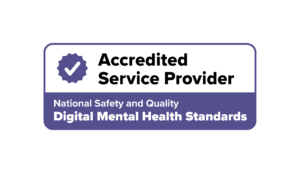ADHD and relationships
“You cannot be in a healthy relationship if you’re not taking care of yourself…so look after yourself.” – Dawn, 40-year-old co-host of the ADHDAF podcast
If you live with a mental health condition such as ADHD – or if you have a friend or family member who does – this can make relationships more challenging at times. But you can still have flourishing relationships, provided that you have healthy levels of communication and mutual support. And for people with mental health conditions, friends and family members can also play a very important supporting role in the treatment process.
Relationships are often complicated at the best of times, and ADHD is almost never going to be the sole source of conflict in a relationship. However, ADHD can make relationships more challenging because of the symptoms associated with it. In this post, we offer some practical tips for people with ADHD and their loved ones.
But first, let’s explore some examples of ADHD symptoms and how they can impact relationships. Please note that, while people with ADHD may experience some of the symptoms in this list of examples, they may also experience a wide range of other symptoms.
● Inattentive symptoms, such as problems with paying attention and maintaining attention on tasks, can make it seem as though the person with ADHD doesn’t care about a conversation they’re having or a task they’ve agreed to do, even though they do.
● Other inattentive symptoms, such as forgetfulness, problems with organisation, and losing things, can be frustrating for both the person with ADHD and their partner, and can be mistaken for laziness or neglectfulness.
● Impulsive symptoms such as interrupting others can cause frustration for the person being interrupted and can make it seem as though the person with ADHD doesn’t care about the other person’s perspective.
● Other impulsive symptoms, such as fidgeting or standing up when someone’s expected to stay sitting, can make it seem as though the person with ADHD isn’t paying attention, even in situations where those behaviours are helping them to pay more attention.
● Problems with emotional regulation can also contribute to or exacerbate disagreements or conflicts.
Tips for people with a loved one with ADHD
If you’d like to better support your loved one with ADHD, the fact that you’re reading this is a good sign – you’re demonstrating a commitment to learn about ADHD and about how you can be more supportive. This means a lot!
Here are some practical tips for other things you can do if you’d like to further support your loved one:
● Remember to also take care of yourself. You can do this by prioritising regular exercise, good sleep habits, healthy eating habits, and self-compassion. You can also make sure that you’re getting medical attention for any conditions that you have.
● Don’t assume that you already know what the person is experiencing, even if you have gone through similar things to them.
● Try to use active listening wherever possible. Asking and listening, rather than telling and advising, will lead to fewer misunderstandings.
● Ask your loved one about their strengths and challenges, and ask them how you can support them in their goals.
● Help your loved one to remember to take their medications, join them as they attend their appointments, and if you can, make the same lifestyle changes they want to make, such as exercising regularly and adopting healthier eating habits.
Tips for people with ADHD
● By investing time and energy in treating your ADHD, you’re also likely to be indirectly helping your relationships. In other words, as you take better care of yourself, it will become easier to take care of others.
● Remember that you are under no obligation to teach people about ADHD just because you have ADHD. However, if you wish, you can read tips on talking to people about ADHD here.
● ADHD is not an “excuse,” and of course it does not excuse unethical behaviour. Instead, it is an explanation of a constellation of symptoms that you may have been struggling with for some time before receiving the diagnosis.
● If you tend to forget to reply to people or forget to stay in touch with friends, talk with your therapist about strategies to remind yourself to stay in touch with the people who matter to you.
● Studies have found positive associations between ADHD symptoms and loneliness. If you feel that you would like to increase the number of supportive relationships in your life, we recommend talking about this with your therapist. You could also join general social groups (such as through meetup.com), interest-based groups, or sporting groups as a way of meeting more people.
● Anecdotally, some people with ADHD also report getting into unhealthy relationships, which some of them report is due to low self-esteem. If you are concerned about your relationship with a partner, friend or family member, we encourage you to talk about this with your therapist. You could also practise advocating for your needs within existing relationships.
Tips for everyone
● Whether you have ADHD or someone in your life has it, clear and open communication is key. This is important for any relationship, of course, but that’s especially true when someone in the relationship has a condition such as ADHD.
● It’s important to build your relationships on mutual respect, trust, compassion, and a desire to understand each other (even when that’s hard).


